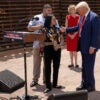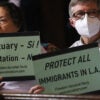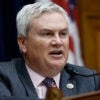The first president of Iran after its 1979 revolution, Abol Hassan Bani-Sadr, has added his voice to the growing chorus calling for regime change in Iran. Bani-Sadr said in an interview that “We would also like the regime to be replaced by a democratic system. However, the position of the west with regards to the current regime is not clear.” He complained that “From my perspective the west needs to be unambiguous about its wants and wishes so that the Iranian people are reassured that it is not looking for an Iranian regime dominated by foreign powers.”
This is not the first time Bani-Sadr, who long has been in exile in France, has expressed hope for the fall of Iran’s thuggish regime. Last summer he wrote an op-ed in the New York Times comparing the popular revolt against the regime to the 1979 revolution.
But Bani-Sadr’s plea for a clear and unambiguous message from the United States has fallen on deaf ears. The Obama Administration remains open to a nuclear deal with the regime. And it continues to look for other forms of “engagement.” Monday, a prominent U.S. official indicated that he is happy to work with Iran’s ruthless regime on drug-smuggling issues. U.S. envoy Glyn Davies said that he had met with Iranian diplomat Ali Asghar Soltanieh, who not only represents Iran on nuclear matters but is the current chairman of the U.N. Commission on Narcotic Drugs. Davies said, “We are very happy to work with the chair even if he is from a country which we have differences with.”
Never mind that Iran’s surrogate in Lebanon, the Hezbollah terrorist group, has been involved in smuggling drugs into Israel and into the United States through Mexico. No wonder that Bani-Sadr has difficulty in understanding U.S. policy regarding Iran.































